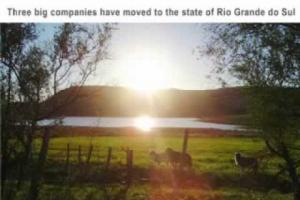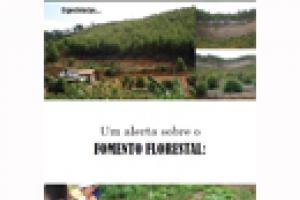World consumption of paper has exploded over the past 50 years. Only about 1/3 of paper production is used for writing and printing paper, most of it is used for advertising. And almost half of all paper produced is used for packaging.
Brazil
Other information
30 March 2009
If after reading the above articles you (as a woman within an organization, as a member of a women’s movement, as an activist on human rights issues, as an environmentalist, as a journalist, as a member of a consumer’s association, as a campaigner on climate issues, trade issues, health issues, etc) are wondering what you can do to start making changes to the current situation, we have some ideas that we hope may be of use.
Multimedia
11 March 2009
By the World Rainforest Movement and Forest and Biodiversity Program of Friends of the Earth International
Other information
27 February 2009
In 1991, the Veracel Celulose company, then known as Verazcruz Florestal, first arrived in the extreme south region of the state of Bahia.
Originally, this hot, humid region was covered with various types of Atlantic Forest, which has since been destroyed and replaced with crops, pastureland and monoculture eucalyptus tree plantations.
Other information
27 February 2009
Concern over the destruction of forests was already documented at the end of the seventeenth century. Since then, some studiesargued that it was necessary to develop knowledge regarding forest use adapted to the situation of tropical forests considering that the way it was being carried out –as well as the slavery-based approach- were destructive and degenerated national morale.
Other information
30 January 2009
Before the current global economic meltdown, the pulp industry had ambitious expansion plans. Although the industry was closing mills in the North, it was expanding dramatically in the South where about five million tons of new capacity was due to start up each year for the next five years. Vast areas of monoculture tree plantations have been established to feed raw material to huge new megamills, particularly in Latin America, southeast Asia and South Africa.
Other information
22 January 2009
(Only available in Portuguese)
By Winfridus Overbeek. Movimento dos Pequenos Agricultores (MPA) do estado do Espírito Santo, with the support of the WRM
Um alerta sobre o Fomento Florestal: experiências...e alternativas
Publications
18 December 2008
By Chris Lang
Bulletin articles
25 November 2008
The present development model has been strengthened on the basis of large-scale models – production, marketing, consumption –
and the activities sustaining it are also on a large scale and basically involve intensive land use. They are the causes of the greatest problem presently hanging over an unconcerned humanity: the stepping up of greenhouse effect gas concentrations in the atmosphere, responsible for climate change.
Bulletin articles
26 October 2008
A pulp mill seriously alters the micro-region where it is installed and generates a series of problems that mainly affect traditional peoples.
Bulletin articles
27 September 2008
Approximately five years ago, Aracruz obtained a “green” quality label for its plantations in the extreme south of Bahia. This is a very important conquest for the Company as this certification implies, among other things, that the Company is working in an ecologically and socially correct manner, respecting all municipal, state and federal environmental laws. Such a label is essential for the Company’s exports because with it, it gains enormous prestige abroad.
Bulletin articles
26 July 2008
This month, provisional measure No.422 was adopted as law by the Brazilian parliament, providing for an increase in the area of the Amazon that may be granted for rural use with no need to call for bids. The limit, previously set at 500 hectares, has been increased to 1,500 hectares, allowing deforestation of up to 20 percent of the area granted.




